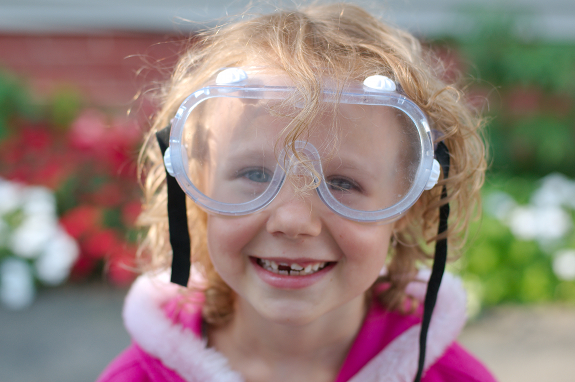Get posts by email
Easy Science
July 21, 2010
My most recent post at Simple Homeschool, 4 (Fun) Basic Elements of Backyard Science is published today and I encourage you to read it if you'd like a bit of lighthearted insight into how we teach science.

I've been working, very slowly I should add, on explaining our family's approach to learning the academic basics in the early education years. So far I've written about math and world study. In the works are reading and writing. I hadn't planned a science post. Not because it isn't important, it is. But I feel it is not as important as a good foundation in reading (books of all kinds), writing and math. Sounds kind of old fashioned, maybe it is.
Which is not to say we don't study science. We do. Everyday. In fact, I find science to be one of the those subjects I don't have to think about teaching my children. It just happens around our house without me making an effort to do so. I think we're just that kind of people.
The kids read scientific books (DK, Eyewitness publishers and the like), watch documentary and educational videos and like to design little experiments. Damien is a computer programmer with a background in civil engineering and often does science activities, around his own interests, with the kids. My Bachelor of Education focus area was secondary biology and math. We are not lacking in scientific mindedness around here.

Our family also loves the outdoors and most of our children's science study has been focused in hands-on nature exploration. This just feels right for their ages and interests. Later, in their high school years they can pursue physics, chemisty and biology in depth if they so choose but I'm not worrying about my 8 year understanding how a battery works, unless they want to know.
My main goal for these years is to lay down the foundation for later study. To keep their interest and curiosity alive, to encourage natural exploration and their own discoveries. From time to time my children believe they have discovered a new scientific principle or species. I love that enthusiasm and open mindedness.
All that to say, I don't teach science beyond our everyday experiences and what my kids specifically ask to learn.
So maybe my lighthearted post today at Simple Homeschool isn't so off the mark. I really believe science is fun. And in our house it's an everyday, hands-on study that helps our children answer questions about the physical world around them.
If you want to know a little bit more what that looks like I highly recommend Stefani's recent post, Simple Tools for Scientific Discovery at Simple Homeschool. Her thoughts very much echo our own approach to early years science education.
How do you approach science education for the elementary years?
PS. I apologize for the lack of recent photos to accompany this post. I ran out of time to find some, these photos are from last year. Brienne's grin has since developed teeth and that's the pond Laurent and I built last summer so he could study creatures.
Filed Under
Resource Library
You can subscribe to comments on this article using this form.
If you have already commented on this article, you do not need to do this, as you were automatically subscribed.






Francesca on July 25, 2010, 6:03 a.m.
This is why I regret not being able to homeschool my children: school doesn't always keep interest and curiosity alive, and I feel that is the main motivation for learning when you're a kid.